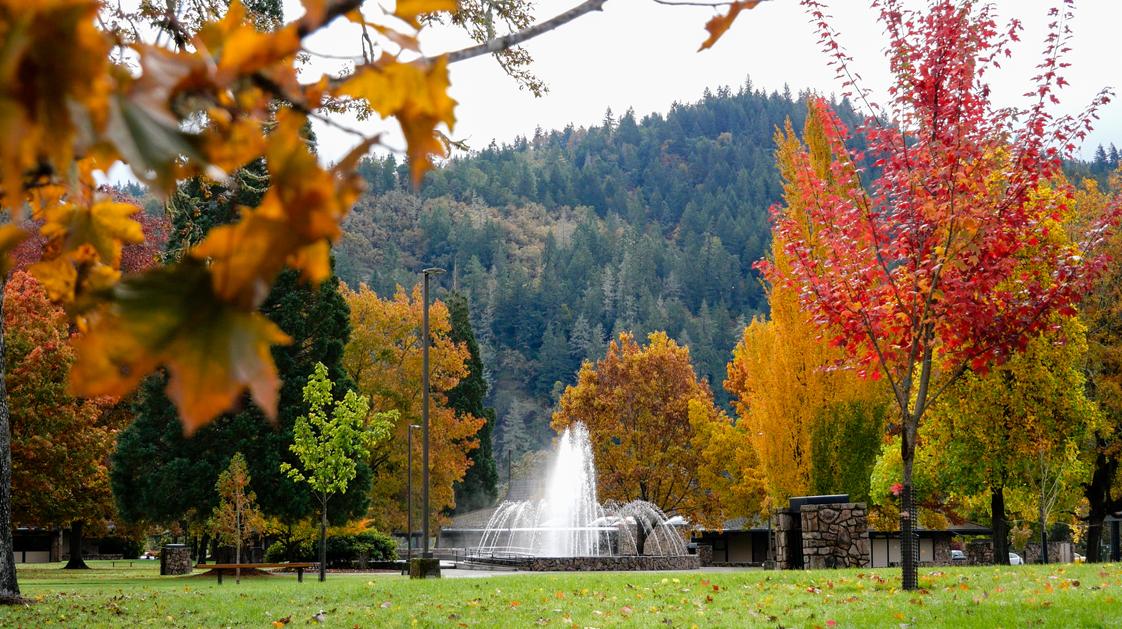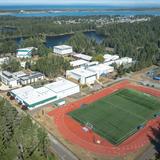- Umpqua Community College is a public community college near Roseburg, Oregon. The college has sixteen campus buildings located on 100 acres bordering the North Umpqua River. The campus also features a track, tennis courts, and an outdoor pool. In 2009, a vineyard was added to the campus.
School Highlights
Umpqua Community College serves 3,390 students (24% of students are full-time).
The college's student-teacher ratio of 13:1 is lower than the state community college average of 21:1.
Minority enrollment is 29% of the student body (majority Hispanic), which is less than the state average of 47%.
Quick Facts (2026)
- Enrollment: 3,390 students
- In-state tuition: $3,990
- Out-state tuition: $8,514
- Student-teacher ratio: 13:1
- Minority enrollment: 29%
- Source: Verified school update
Top Rankings
Umpqua Community College ranks among the top 20% of public schools in Oregon for:
Category
Attribute
School Resources
Debt For Students
School Overview
The teacher population of 268 teachers has stayed relatively flat over five years.
Umpqua Community College
(OR) Community College Avg.
Carnegie Classification
Associate's Colleges: High Transfer-Mixed Traditional/Nontraditional
Not applicable, not in Carnegie universe (not accredited or nondegree-granting)
Institution Level
Less than 2 yrs
At least 2 but less than 4 years
Institution Control
Public
Private not-for-profit
Year Founded
1964
Total Faculty
268 staff
192 staff
School Calendar
Student Body
The student population of Umpqua Community College has grown by 58% over five years.
The student-teacher ratio of 13:1 has decreased from 21:1 over five years.
The Umpqua Community College diversity score of 0.47 is less than the state average of 0.66. The school's diversity has grown by 38% over five years.
Total Enrollment
3,390 students
2,463 students
Student-Teacher Ratio
13:1
21:1
# Full-Time Students
801 students
310 students
# Part-Time Students
2,589 students
2,153 students
# Enrollment Undergraduate
339 students
339 students
# Full-Time Undergraduate Students
801 students
310 students
# Full-Time Graduate Students
n/a
193 students
# Part-Time Undergraduate Students
n/a
2,589 students
# Part-Time Graduate Students
n/a
153 students
Total Dormitory Capacity
n/a
270 students
% American Indian/Alaskan
1%
1%
% Asian
2%
5%
% Hispanic
13%
20%
% Black
2%
3%
% White
71%
53%
% Hawaiian
n/a
1%
% Two or more races
6%
5%
% Non Resident races
n/a
1%
% Unknown races
4%
11%
Diversity Score
0.47
0.66
College Completion Rate (Students who graduate in less than 4 years)
25%
42%
College Completion Rate (Students who graduate in 4 years or more than 4 years)
n/a
58%
Average Graduate Earnings (10 Years)
$33,800
$33,800
Tuition and Acceptance Rate
The public in-state tuition of $3,990 is less than the state average of $4,172. The in-state tuition has declined by 24% over four years.
The public out-state tuition of $8,514 is more than the state average of $6,738. The out-state tuition has grown by 60% over four years.
In-State Tuition Fees
$3,990
$4,172
Out-State Tuition Fees
$8,514
$6,738
Tuition Notes
$120 per credit
% Students Receiving Some Financial Aid
90%
79%
Median Debt for Graduates
$7,881
$12,875
Median Debt for Dropouts
$3,500
$6,334
Acceptance Rate
n/a
100%
Source: 2024 (or latest year available) Integrated Postsecondary Education Data System (IPEDS) , School Administrators
School Notes
- School Mascot: Riverhawk
- The college was established by a vote of greater Douglas County residents in 1964 and conducted classes in various rented facilities in Roseburg for the first few years. Since its founding as a post-secondary education facility it has grown and changed to meet the diverse needs of the community. More than 15,000 students take one or more classes each year, for a full-time equivalent (FTE) of about 2,600 full-time students. Umpqua Community College is one of the most picturesque colleges in the country, nestled between beautiful tree-studded hills and overlooking a large bend in the North Umpqua River. Natural volcanic rock and rustic, cedar shake architecture grace the 14 campus buildings located on a 100-acre plot of land six miles north of Roseburg. UCC Campus easy access and mild year-around climate complement the scenic beauty of the campus. As a comprehensive community college, Umpqua Community College provides the first two years of a baccalaureate degree, professional-technical programs, adult basic education/GED, and community education. The college strives to work with individual students so that educational goals and dreams can be realized. Our primary focus is to foster student success by creating access and excellence in all programs and services offered at Umpqua Community College. Umpqua Community College is organized into four academic divisions namely Business and Industry, Health and Safety Services, Math, Science, and Learning Skills and Liberal Arts.
- Sample of notable school alumni/alumnae:
- Joseph Ziegler, Google and Uber employee, class of 2008 -
- Joyce Blair, return to school scholarship recipient -
Frequently Asked Questions
How much does Umpqua Community College cost?
Umpqua Community College's tuition is approximately $3,990 for In-State students and $8,514 for Out-State students.
Who are famous alumni from Umpqua Community College?
Umpqua Community College famous alumni include: Joseph Ziegler, Google and Uber employee, class of 2008 and Joyce Blair, return to school scholarship recipient.
What is Umpqua Community College's ranking?
Umpqua Community College ranks among the top 20% of community college in Oregon for: Percent of students receiving financial aid and Least debt for graduating students.
Recent Articles

How to Transfer to a Four-Year University Without Losing Credits
Learn how to transfer to a four-year university without losing credits in 2026, including agreements, planning tips, and expert guidance.

First-Generation Student Guide to Community College Success
A first-generation student guide to navigating your first semester at community college, with academic, financial, and campus life strategies.

Most In-Demand Community College Majors for 2025–26
Explore the most in-demand community college majors for 2025–26 workforce needs, aligned with hiring trends, wages, and transfer pathways.















